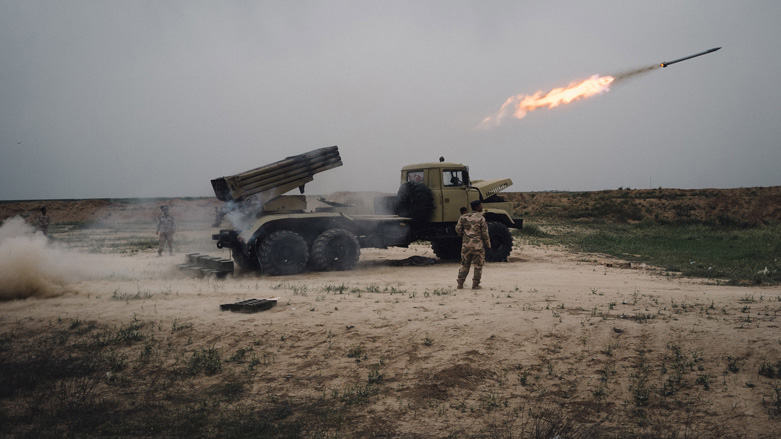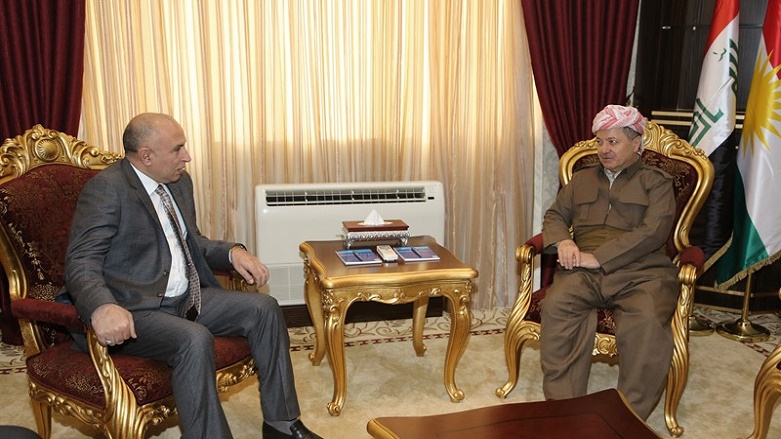KRG delegation discusses Mosul offensive in Washington

WASHINGTON, United States (Kurdistan24) - In remarks on Tuesday, Kurdistan Regional Government (KRG) Deputy Prime Minister Qubad Talabani and Minister of Interior, Karim Sinjari, provided new details about the upcoming offensive to liberate Mosul.
The two are in Washington DC as part of a senior KRG delegation discussing critical issues with US officials.
Sinjari explained that the Peshmerga now hold positions east, west, and north of Mosul, some 15-20 kilometers from Islamic State (IS) lines. Although the Peshmerga will play a major role in liberating the city, they “will not enter Mosul,” he stated.
The discussion at the Foundation for the Defense of Democracies (FDD), a Republican-oriented think-tank, generally critical of the Obama administration, was moderated by New York Times reporter, Michael Gordon.
Gordon pressed the Minister on that point, but Sinjari explained that the population of Mosul was a complex “mosaic” and affirmed that the KRG did not want to create a situation in which Kurds would be fighting Arabs.
When asked if Shia militias should be part of the Mosul offensive, Sinjari suggested that they, too, should be kept from entering the city. He said that IS had begun to show footage of the Hashd al-Shaabi on its Mosul television station in an effort to make the city’s residents fear the US-led coalition.
Sinjari’s conclusion was that the Iraqi Army and Sunni tribal militias should be the forces that actually go into Mosul.
Sinjari described the situation in the city as “catastrophic.” There are no jobs. IS pays people $200 a month to fight, and it is even recruiting teenagers, some as young as 12 years old.
IS is sending its foreign fighters to the outskirts of the city. They will be its first line of defense against an external attack on Mosul.
The Mosul offensive will exacerbate the already dire circumstances of refugees in the Kurdistan Region, Talabani told the audience. Another half million refugees are expected, in addition to the 1.8 million displaced people whom the Kurdistan Region already hosts.
Talabani made clear that the refugees are one more issue in the series of disputes between Erbil and Baghdad. Baghdad sends the refugees to the Kurdistan Region on one way tickets, and then it fails to provide funds to cover their basic needs.
Gordon raised the question of Iran, asking Sinjari about its role, as “I know this audience would like to hear that” (the FDD favors a much tougher US stance on Iran.) How would you characterize the impact of Tehran’s actions? Gordon asked.
Sinjari replied that Iran had “helped” the Kurds “in the beginning,” as IS first threatened the Kurdistan Region, a gentle reminder of the initially slow US response.
But Sinjari would not get drawn into criticizing Tehran, prompting chuckles from the audience and Talabani to quip, “If that is the Minister of Interior, imagine how the Minister of Foreign Affairs would answer.”
Talabani also stressed that the military aspect of liberating Mosul “is less complicated” than the political: how to establish an accepted governing authority there.
The KRG’s economic crisis and its impact on the anti-IS fight also arose, Peshmerga have not received salaries for three months, Sinjari explained. Sometimes when they go home on leave, they do not return as scheduled, but do other work to earn money to pay for basic expenses, like rent and food.
Desertion rates now are low, but if this continues it could “affect the fight,” he said.
James Philipps, a Senior Research Fellow at the Heritage Foundation, remarked afterwards that he was “sorely disappointed, but not surprised” that the Obama administration had yet to address this basic problem.
Editing by Delovan Barwari

